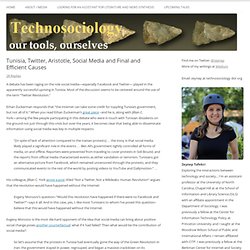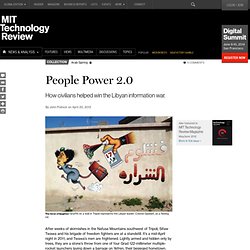

Tunisia, Twitter, Aristotle, Social Media and Final and Efficient Causes. A debate has been raging on the role social media—especially Facebook and Twitter— played in the apparently successful uprising in Tunisia.

Most of the discussion seems to be centered around the use of the term “Twitter Revolution.” Ethan Zuckerman responds that “the Internet can take some credit for toppling Tunisia’s government, but not all of it.” When you read Ethan Zuckerman’s great piece –and he is, along with Jillian C. York—among the few people participating in this debate who were in touch with Tunisian dissidents on the ground not just through this crisis but over the years, it becomes clear that being able to disseminate information using social media was key in multiple respects: “[In spite of lack of attention compared to the Iranian protests] … the irony is that social media likely played a significant role in the events … Ben Ali’s government tightly controlled all forms of media, on and offline.
His colleague, Jillian C. So what to make of all of this? Summary. People Power 2.0. The force of laughter: Graffiti on a wall in Tripoli represents the Libyan leader, Colonel Qaddafi, as a fleeing rat.

After weeks of skirmishes in the Nafusa Mountains southwest of Tripoli, Sifaw Twawa and his brigade of freedom fighters are at a standstill. It’s a mid-April night in 2011, and Twawa’s men are frightened. Lightly armed and hidden only by trees, they are a stone’s throw from one of four Grad 122-millimeter multiple-rocket launchers laying down a barrage on Yefren, their besieged hometown. These weapons can fire up to 40 unguided rockets in 20 seconds.
Each round carries a high-explosive fragmentation warhead weighing 40 pounds. Two friends are on the line, via a Skype conference call. Indeed, civilians have “rushed the field,” says David Kilcullen, author of The Accidental Guerrilla, a renowned expert on counterinsurgency and a former special advisor to General David Petraeus during the Iraq War. Nabbous had pitched a brightly lit virtual tent in a darkening Libya. Yousri Marzouki: Revolutionizing Revolutions: Virtual Collective Consciousness and the Arab Spring. Discussions about the influence of social media often remind those on the impact of TV in the 1980s: Everyone has an opinion, some have statistics, and a few others are trying to understand the psychological and sociological mechanisms that lie beneath. The incredible connectivity amongst people that is provided by social media, combined with the speed at which information is exchanged and its potential global reach, have significantly empowered people.
One way to have an estimate of this empowerment is to look at how users managed to "hijack" some social media platforms from their initial use. Twitter and Facebook users provide a spontaneous snapshot of their individual states of minds but, unintentionally, they also turn them into an incredible tool for collective estimates of behavioral dynamics (see, for example, a recent study on happiness) and crowdsourcing. Think about what history will now remember as the Arab Spring.